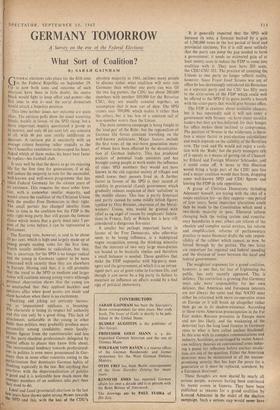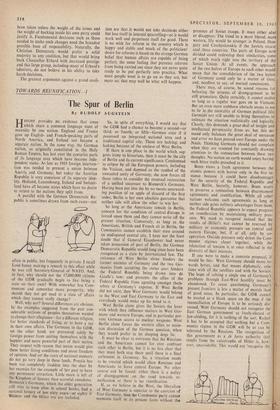GERMANY TOMORROW
A Survey on the eve of the Federal Elections
What Sort of Coalition?
By SARAH GAINHAM
GENEKAL elections take place for the fifth time in the Federal Republic on September 19. Up to now both issue and outcome of such elections have been in little doubt; the centre block would fight to keep office and power—the first time to win it—and the social democrats would attack a hopeless position.
This time neither issues nor outcome are quite Clear. The opinion polls show the usual wavering trends, mainly in favou of the SPD rising; but a more important inquiry questioned a group as to interest, and only 48 per cent felt any concern at all, with 46 per cent totally indifferent or ignorant. A cartoon put it succinctly with an average citizen beaming rather stupidly as the two Chancellor candidates stethoscoped his heart. Asked which of them makes his heart beat faster he replies—his football club.
It may well be that the desire to go on enjoying life for the first time for generations, if at all, Will induce the majority to vote for the successful, Well-known and well-worn programme that has
) ruled Federal Germany for the sixteen years of its existence. This remains the most sober fore- cast, with a somewhat smaller majority, and would return the coalition of the Christian Union With the smaller Free Democrats to their right. The small partner has changed identity from time to time in the coalition but the FDP is the only right-wing party that still passes the famous Clause which insists that a party must take 5 per cent of the votes before it can be represented in Parliament.
The floating vote, however, is said to be about 25 per cent, which is high and largely made up of Young people casting votes for the first time. Youth usually inclines to radicalism, but that, too, is uncertain, for the SPD is no longer radical and the young in Germany appear to be more concerned with security than they are elsewhere in Europe. Having said that, it is still probable that the trend to the SPD in medium and larger towns will continue among young voters although Personal observation shows that the young are 8 so unattached . that they applaud hecklers and Speakers alike when good points are made and Show boredom when there is no excitement.
Heckling and joking are certainly increas-
ing as - impassioned applause is . lessening. The electorate is losing its respect for authority and this can only be a good thing. This lack of attachment, noticeable in the . young in other fields than politics, may gradually produce more Personality among candidates, more locally- known figures from the constituencies and less of the party-machine professionals delegated by central offices to places they know little about. The international tendency towards professional- ism in politics is even more pronounced in Ger- Ifiany than in some other countries owing to the Perfectionism that dominates German habits of thinking, especially in the law. But anything that interferes with the depersonalisation of politics is good and it is noticeable how much more the Younger members of an audience take part than
they used to do.
, local and Land (provincial) elections in the last 4."/ years have shown quite strong moves towards tne SPD . and this, with the loss of the CDU's
absolute majority in 1961, inclines many people to discuss rather what coalition will next rule Germany than whether one party can win. Of the two big parties, the CDU has about 280,000 members with another 100,000 for the Bavarian CSU; they are usually counted together, an assumption that is now out of date. The SPD counts over 700,000, which makes it richer than the others, but it has less of a constant tail of non-member voters than the Union.
The most intensive campaign is being fought in the 'coal-pot' of the Ruhr, but the regionalism of
German life forces constant travelling on the well-known politicians. , Major factors include the first votes of the war-born generation many of whom have been affected by the decentralisa- tion of German industry. This has produced pockets of potential trade unionists and has brought young people at work under the influence of older SPD members they would not have known in the old regional society of villages and small towns their parents lived in. A further factor in favour of the SPD is their record of stability in provincial (Land) government which gradually reduces suspicion of their 'socialism' in the middle classes. This fear is partly historical and partly caused by some mildly leftish figures typified by Otto Brenner, chairman of the Metal- workers' Union, who would be greeted with relief as aa angel of reason by employers' federa- tions in France, Italy or Britain but is here still considered a dangerous fire-eater.
A smaller but perhaps important factor in favour of the Free Democrats, who otherwise seem to be losing influence, is a widespread vague recognition among the thinking minority that the interests of two very large mass-parties are bound to be basically similar and therefore a small balancer is needed. Those qualities that make the FDP unpopular with big-party man- agers and the government, of which it is an intran- sigent part, are of great value in German life, and though it can never be a big party its failure to maintain an influence on affairs would be a bad sign of political immaturity.
It is generally expected that the SPD will increase its vote, a forecast backed by a gain of 1,700,000 votes in the last period of local and provincial elections. Yet it is still most unlikely that the party can jump the gap needed to form a government; it needs an estimated gain of at least twenty seats to induce the FDP to come into coalition with it. They now have 203 seats, the CDU-CSU 251. The practice of counting the Unions as one party no longer reflects reality, however. Since Franz Josef Strauss was out of office he has increasingly considered his Bavarians as a separate party and the CSU has fifty seats to the sixty-seven of the FDP whieh could well be offered to the SPD if its gains justify a breach with the sister-party that would give Strauss office.
The FDP is cautious about coalition chances, but is has repeatedly said it will not enter a government with Strauss--so have many socialist leaders but they are less believed, for their hunger for office makes them inclined to compromise. The position of Strauss in the wilderness is there- fore a major factor in post-election calculations and much depends on the stability of the Bavarian vote. The rank and file would not enjoy a coali- tion with the 'Reds,' but the party managers talk of it openly as a means of getting rid of Chancel- lor Erhard and Foreign Minister Schroeder, and it could come off. A move in this direction would bring a large part of the CDU into line and a major coalition would then form, dropping some well-known SPD and CDU figures and leaving the FDP in sole opposition.
A group of Christian Democrats, including Adenauer himself, are toying with the idea of a major coalition for—as they suppose—one period of four years. Some important alterations could then be made to the Constitution which need a two-thirds majority to pass. Electoral reform changing both the voting system and constitu- ency boundaries is one; others are reform of the obsolete and complex social services, tax reform and simplification, reforms of parliamentary practice to make financial drafts the sole respon- sibility of the cabinet which cannot, as now, be forced through by the parties. The two latter are important for regional and federal spending and the division of taxes between the local and ' federal governments.
The weightiest argument for a grand coalition, however, is one that, for fear of frightening the public, has only recently appeared. This is defence. The conviction is growing that Germany must take more responsibility for her own . defence, that American and European interests are not always the same and that NATO must either be reformed with more co-operative stress on Europe or it will break up altogether rather than go on in its shadow-existence. According to these views American preoccupation in the Far East makes Russian pressures in Europe more and not less likely, and the weakening of the deterrent lays the long land frontier in Germany open to what is here called nuclear blackmail. In this area with its complex communications and industry, hostilities, as envisaged by recent Ameri- can military theories on conventional arms induc- ing a pause for reflection before nuclear escala- tion, are out of the question. Either the American deterrent must be maintained in all the uncom- promising severity that has kept the peace for a generation or it must be replaced, somehow, by a European deterrent: These thoughts are now shared by nearly all serious people, waverers having been convinced by recent events in Geneva. They have been published as reasons for a grand coalition by Konrad Adenauer in the midst of the election campaign. Such a serious step would never have "
been taken unless the weight of the issues and the weight of backing inside his own party could justify it. Fundamental decisions such as those needed to make such changes need the broadest possible base of responsibility. Naturally, the Christian Democrats would prefer a solid majority to any coalition, but that would bring back Chancellor Erhard with increased prestige and this large group, including many of Erhard's admirers, do not believe in his ability to take harsh decisions.
The greatest arguments against a grand coali- tion are that it would not take decisions either but lose itself in internal quarrelling—or it would work well and perpetuate itself for good. There is no wish for reform in the country which is happy and stable and much of the politicians' desire for reforms is based on the strange German belief that human affairs are capable of being perfect; the same feeling that prevents reforms from being carried out since they are never quite ready to be put perfectly into practice. What most people want is to go on as they are, but more so; that may well be what will happen.



































 Previous page
Previous page